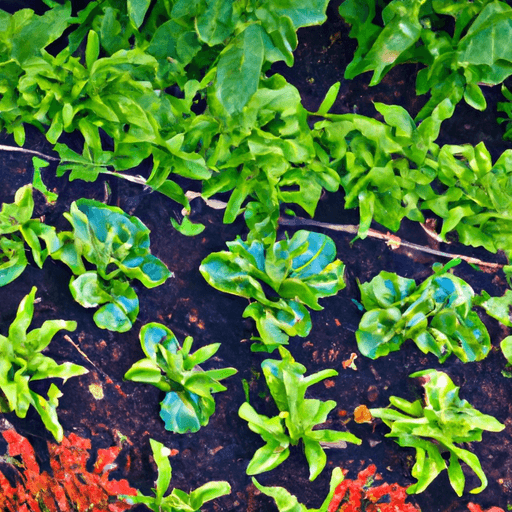Rubber mulch has gained popularity as a landscaping option, particularly in areas where safety is a concern, such as playgrounds. However, questions have been raised about its impact on plant health.
Made from recycled tires, rubber mulch offers advantages like durability and resistance to insects and erosion. Yet, it also has drawbacks, including an artificial appearance and higher cost.
Concerns about zinc leaching into the soil, flammability, and the presence of contaminants have led experts to question its safety. Before using rubber mulch, it is crucial to understand its potential risks and explore alternative options for plant health.
Potential Risks of Rubber Mulch
Rubber mulch poses potential risks to plants due to the leaching of small amounts of zinc into the soil over time. This issue has sparked the toxicity debate surrounding rubber mulch and raised environmental concerns.
Studies have shown that as rubber mulch breaks down, it releases zinc, which can accumulate in the soil. Zinc is a necessary nutrient for plants, but excessive amounts can be toxic. The leaching of zinc from rubber mulch can potentially disrupt the balance of nutrients in the soil, leading to negative effects on plant health and growth.
Additionally, the environmental concerns arise from the fact that rubber mulch is a recycled product made from tires, which may contain other contaminants that could further impact soil quality and plant well-being.
Further research is needed to fully understand the extent of these potential risks and develop appropriate mitigation strategies.
Benefits of Rubber Mulch for Plants
Linda Chalker-Scott, Ph.D., expresses doubts about the effectiveness and safety of rubber mulch for plant growth. While there are some perceived benefits of using rubber mulch in gardens, it is important to consider its impact on plant health and water conservation.
Here are some potential benefits of rubber mulch for plant growth:
- Moisture retention: Rubber mulch can help retain moisture in the soil, reducing the need for frequent watering.
- Weed suppression: The dense nature of rubber mulch can help prevent weed growth, reducing competition for nutrients and water.
- Temperature moderation: Rubber mulch can act as an insulator, protecting plants from extreme temperatures.
- Erosion control: Rubber mulch can help prevent soil erosion, especially in sloped areas.
However, it is crucial to weigh these potential benefits against the safety concerns associated with rubber mulch. Further research is needed to fully understand its long-term effects on plant growth and the environment.
The Impact of Rubber Mulch on Soil Health
The use of rubber mulch in gardens raises concerns about its potential impact on the health of the soil. Many gardeners wonder about the effect of rubber mulch on plant growth and the overall environmental impact.
Research suggests that rubber mulch may have both positive and negative effects on the soil. On one hand, rubber mulch provides long-lasting mulching, doesn’t wash away in rainstorms, and doesn’t attract insects. On the other hand, it may leach small amounts of zinc into the soil over time, which could potentially harm plants. Additionally, rubber mulch is not as effective as organic choices for weed control.
It is important to consider the potential environmental impact and weigh the pros and cons before using rubber mulch in gardens.
Understanding the Chemical Composition of Rubber Mulch
Experts have conducted research to understand the chemical composition of rubber mulch and its potential impact on the environment. Through chemical composition analysis, they have found that rubber mulch is made from recycled tires, which contain various chemicals and metals. When rubber mulch is used in gardens and landscapes, there is a concern about leaching effects.
Here are four key findings from the research:
-
Zinc leaching: Small amounts of zinc in rubber mulch may leach into the soil over time.
-
Potential harm to plants: The leached zinc from rubber mulch could lead to chemical overload and harm plants.
-
Environmental and health effects: Rubber mulch contains metal and organic contaminants with known environmental and health effects.
-
Alternative options: Organic choices, such as wood bark, are considered more effective and safe for mulching.
These findings highlight the importance of considering the chemical composition and potential leaching effects of rubber mulch before using it in gardens and landscapes.
Comparing Rubber Mulch to Organic Mulch Options
Comparing the advantages and disadvantages, organic mulch options are considered more effective and environmentally friendly than rubber mulch. While rubber mulch has its benefits, such as not washing away in rainstorms, not attracting insects, and providing long-lasting mulching, it also has potential drawbacks and a significant environmental impact. One of the major drawbacks of rubber mulch is its artificial appearance, which may not be aesthetically pleasing to some gardeners. Additionally, rubber mulch is more expensive than other mulch options, making it less accessible for some individuals. Moreover, there is concern that small amounts of zinc in rubber may leach into the soil over time, potentially causing harm to plants. In terms of environmental impact, rubber mulch contains metal and organic contaminants that have known effects on the environment and human health. In contrast, organic mulch options, such as wood bark, are considered safer and more effective for weed control. It is important to make informed decisions and explore alternative mulch options that have minimal environmental impact.
| Advantages of Organic Mulch | Disadvantages of Rubber Mulch |
|---|---|
| Environmentally friendly | Artificial appearance |
| Effective for weed control | High cost |
| Safe for plants | Potential zinc leaching |
| Aesthetically pleasing | Environmental impact |
Expert Insights on the Safety of Rubber Mulch
One expert’s opinion on the safety of rubber mulch raises concerns about its potential environmental and health effects. Linda Chalker-Scott, Ph.D., has negative views on rubber mulch, citing potential dangers and environmental concerns. Here are four key points to consider:
-
Flammability: Rubber mulch is highly flammable and difficult to extinguish once burning. This poses a risk to both the environment and human safety.
-
Contaminants: Rubber mulch contains metal and organic contaminants with known environmental and health effects. These contaminants may leach into the soil over time, potentially harming plants and surrounding ecosystems.
-
Decomposition: Contrary to popular belief, rubber mulch decomposes over time, similar to organic mulch. This process can release harmful substances into the environment.
-
Safer Alternatives: Organic choices, such as wood bark, are considered more effective and safe for gardens and landscapes.
Considering these concerns, it is important to thoroughly research the safety of rubber mulch before using it and explore alternative mulch options to minimize potential environmental and health risks.
Tips for Using Rubber Mulch Safely in Your Garden
To use rubber mulch safely in a garden, individuals should consider the following tips.
- Proper installation is crucial for maintaining the integrity and effectiveness of rubber mulch.
- It is recommended to prepare the ground by removing any existing vegetation and debris.
- Next, a weed barrier should be installed to prevent weed growth.
- The rubber mulch should be evenly spread at a depth of 2-3 inches, ensuring that it is not piled against plant stems or trunks.
Regular inspection and maintenance are essential to keep the rubber mulch in good condition.
- It is important to periodically check for any signs of wear, tear, or displacement, and address these issues promptly.
- Additionally, it is advised to avoid placing rubber mulch near heat sources or open flames to prevent fire hazards.
Exploring Alternatives to Rubber Mulch for Plant Health
Researchers have identified alternative options to rubber mulch that promote plant health and safety in gardens and landscapes. These alternatives address the potential hazards and environmental concerns associated with rubber mulch.
Here are four alternative options to consider:
-
Wood Bark: Organic and biodegradable, wood bark is a safe and effective mulching choice. It helps retain moisture, control weeds, and enrich the soil as it decomposes.
-
Straw: Straw is a cost-effective option that provides insulation for plants, prevents weed growth, and enhances soil health. It also decomposes naturally, adding nutrients to the soil.
-
Cocoa Bean Hulls: These lightweight and attractive mulch can suppress weeds, retain moisture, and improve soil structure. However, they should be used sparingly due to their potential toxicity to pets if ingested.
-
Pine Needles: Pine needles are an excellent mulching choice for acid-loving plants. They help retain moisture, control weeds, and gradually release nutrients into the soil.
Frequently Asked Questions
Can Rubber Mulch Harm the Growth of Plants?
Rubber mulch has potential risks on plant growth. It contains zinc that may leach into the soil over time, leading to chemical overload that could harm plants. Further research is needed to understand its effects.
Are There Any Environmental Concerns Associated With Using Rubber Mulch?
The use of rubber mulch raises environmental concerns due to its decomposition and potential leaching of contaminants into the soil. Health concerns arise from its flammability and presence of known metal and organic contaminants.
How Does the Chemical Composition of Rubber Mulch Differ From Organic Mulch Options?
The chemical composition of rubber mulch differs from organic options, potentially impacting the environment. It contains metal and organic contaminants with known effects. Research on its safety is crucial before use in gardens and landscapes.
What Are the Potential Long-Term Effects of Using Rubber Mulch on Soil Health?
The potential risks of using rubber mulch on soil health and its impact on the ecosystem are important considerations. Research should be conducted to determine the long-term effects before deciding to use rubber mulch.
Are There Any Specific Safety Precautions That Should Be Taken When Using Rubber Mulch in a Garden?
Safety precautions should be taken when using rubber mulch in a garden. The impact on plant growth is a concern. Researching the safety of rubber mulch and considering alternative options is recommended.







